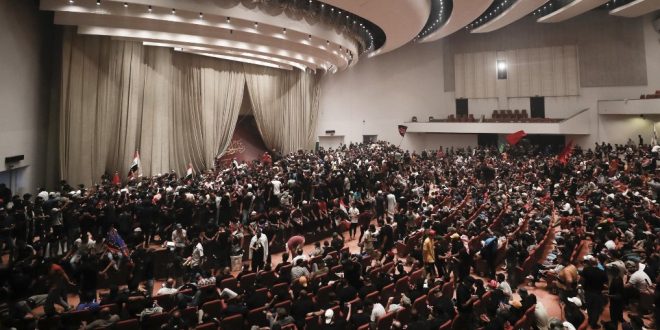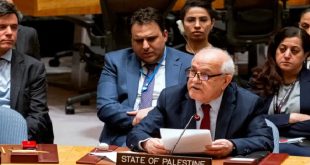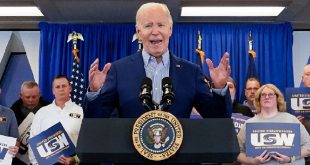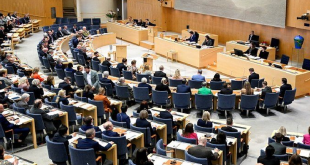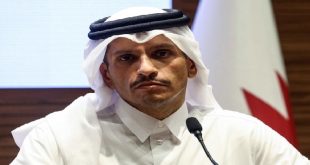31-07-2022
BAGHDAD: Supporters of powerful Iraqi leader Muqtada al-Sadr who have occupied the country’s parliament say they have no plans to leave, deepening a months-long political standoff.
On Saturday, supporters of the firebrand al-Sadr forced their way into the legislative chamber for the second time in days, after October elections failed to lead to the formation of a government.
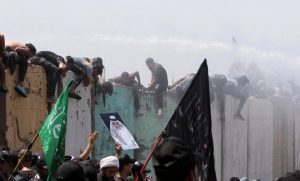 “The demonstrators announce a sit-in until further notice,” al-Sadr’s movement said in a brief statement to journalists carried by state news agency INA.
“The demonstrators announce a sit-in until further notice,” al-Sadr’s movement said in a brief statement to journalists carried by state news agency INA.
According to the Ministry of Health, about 125 people were injured during Saturday’s protest, 100 protesters and 25 members of security forces.
Parliament Speaker Mohammed Halbousi suspended future sessions until further notice.
In multi-confessional and multiethnic Iraq, government formation has involved complex negotiations since the 2003 invasion led by the United States toppled Saddam Hussein.
Supporters of al-Sadr, who once led a militia against US and Iraqi government forces, oppose a rival, pro-Iran Shia bloc’s pick for prime minister – Mohammed Shia al-Sudani.
The post conventionally goes to a figure from Iraq’s Shia majority.
“We don’t want Mr Sudani,” said one protester, Sattar al-Aliawi, 47.
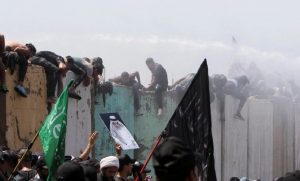 The civil servant said he was protesting against “a corrupt and incapable government” and would “sleep here” in the gardens of parliament.
The civil servant said he was protesting against “a corrupt and incapable government” and would “sleep here” in the gardens of parliament.
He added: “The people totally refuse the parties that have governed the country for 18 years.”
Longest political vacuum
Al-Sadr’s bloc emerged from elections in October as the biggest parliamentary faction, but was still far short of a majority. In June, al-Sadr’s 73 legislators quit their seats in a move seen as an attempt to pressure his rivals into fast-tracking the formation of a government.
Now, 10 months since the last elections, the political vacuum is shaping up to be the longest since 2003 when Hussein was removed and killed, resetting the country’s political order.
Al-Sadr’s rivals in the Coordination Framework, an alliance of Shia parties backed by Iran and led by former Prime Minister Nouri al-Maliki, showed signs of internal divisions later on Saturday.
At first, the alliance called for “peaceful” counter-protests to defend the state, raising fears of possible street clashes and interethnic violence.
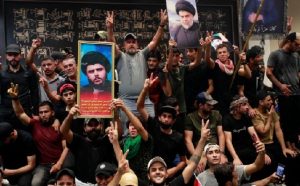 “Civil peace is a red line and all Iraqis must be prepared to defend it in all possible, peaceful, means,” the alliance said.
“Civil peace is a red line and all Iraqis must be prepared to defend it in all possible, peaceful, means,” the alliance said.
Later, Hadi al-Amiri, also an alliance leader, issued a statement inviting our “dear brother” al-Sadr to “a serious dialogue” to find a way out of the impasse. Al-Maliki also appeared to pivot and issued a statement saying the day’s tumultuous events had prompted him to call for dialogue with al-Sadr.
Journalist Mahmoud Abdelwahed, reporting from Baghdad, said Saturday’s parliamentary session had initially been dedicated to electing a new president, followed by the naming of a prime minister, who would then form a new government.
“All that is now on hold, giving rival politicians a chance to meet,” he said. “But these protesters are worried that MPs could hold an unannounced session to approve al-Sudani. So now they’re in for the long haul.” (Int’l News Desk)
 Pressmediaofindia
Pressmediaofindia
